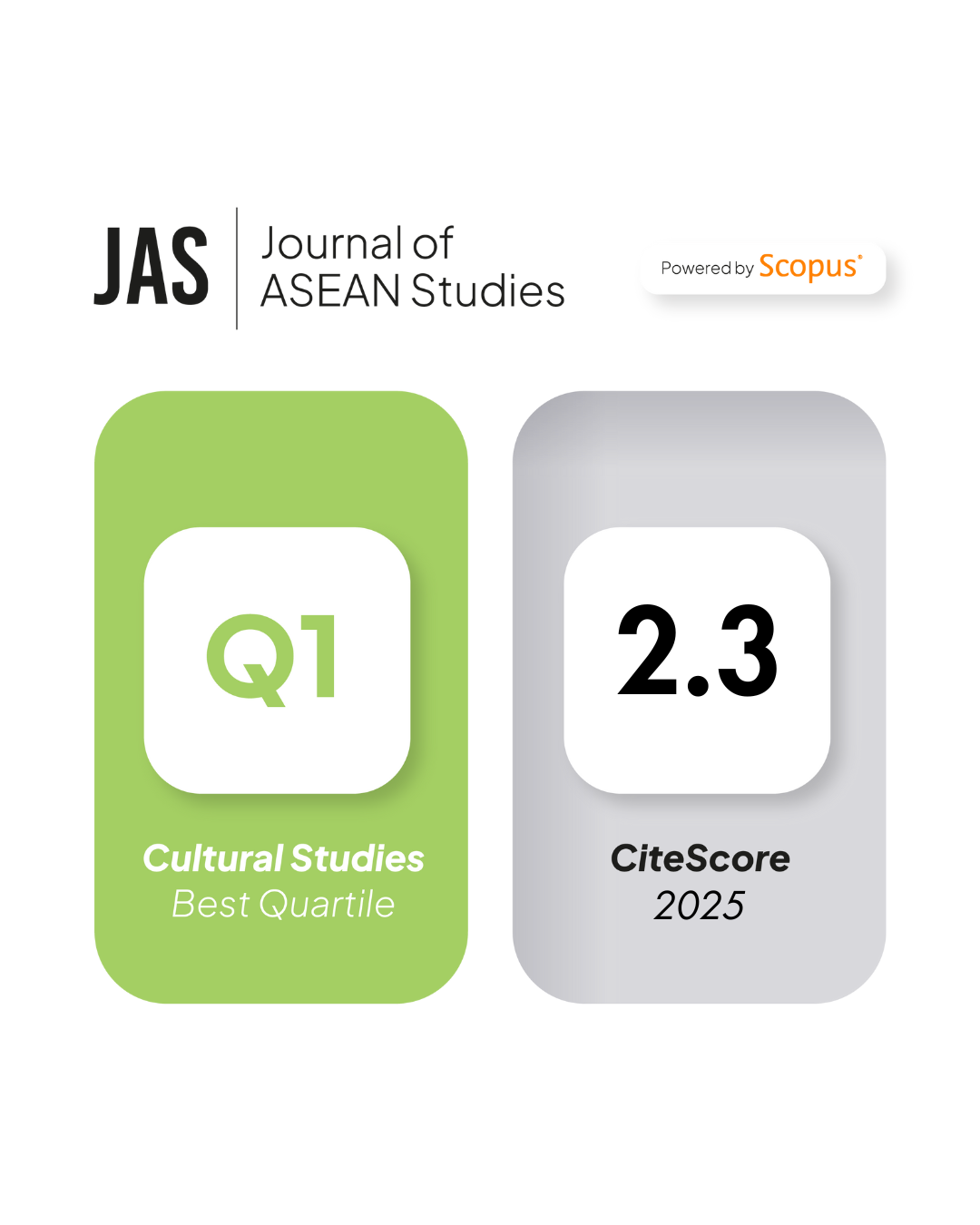The Coalitional Presidentialism and Presidential Toolbox in the Philippines and Indonesia
DOI:
https://doi.org/10.21512/jas.v12i2.11449Keywords:
presidential toolbox, executive-legislative relations, coalition-building, Southeast Asia, multiparty presidentialismAbstract
The research examined the contrasting experiences of the Philippines and Indonesia, two countries with multiparty presidential systems, in managing executive-legislative relations. While the presidentialism framework warns of institutional gridlock, the analysis reveals that Rodrigo Duterte and Joko Widodo effectively navigated these dynamics through the strategic use of presidential powers. The qualitative comparative analysis examines how the respective leaders leveraged coalition-building, patronage, and budgetary powers in divergent ways by applying a presidential toolbox framework. Duterte heavily relied on pork-barrel allocations and patronage to secure legislative support in the Philippines, while Jokowi pursued broad coalition-building, integrating opposition parties into the Indonesian cabinet. The findings suggest that the successful application of presidential toolboxs, rather than institutional design alone, plays a critical role in ensuring political stability within fragmented party systems. This challenges deterministic assumptions about the perils of presidentialism, offering a more nuanced understanding of executive adaptability in Southeast Asia. The research contributes to the comparative literature by refining the coalitional presidentialism model in emerging democracies, illustrating how distinct leadership styles, institutional arrangements, and informal practices influence the viability of multiparty presidential systems.
References
Abofarha, E. A.., & Nasreldein, R. I. (2022). Explaining presidential instability in Latin America: Evidence from Brazil, Argentina and Ecuador. Review of Economics and Political Science, 7(1), 56-70
Akarçay, E. İ. (2022). Unraveling presidentialism: Learning from the Latin American experience. Alternatif Politika, 12 (1), 204-227
Alami, A. N., Luong, D. N. A., Prihatini, E., Ramadhani, E., Go, J. R. R., Hafidzah, N., & Atiyah, U. (2023). Democratization in the Digital Era: Experience from Southeast Asia. JAS (Journal of ASEAN Studies), 10(2). https://doi.org/10.21512/jas.v10i2.9361
Asrinaldi, & Yusoff, M. A. (2023). Power consolidation and its impact on the decline of democracy in Indonesia under President Jokowi. Cogent Social Sciences, 9(1). https://doi.org/10.1080/23311886.2023.2232579
Beso, A. J., & Rahmawati, R. (2021). Hubungan eksekutif dan legislatif pada era Presiden Joko Widodo periode 2014-2019. Jurnal Polinter: Kajian Politik dan Hubungan Internasional, 6(2), 89-112.
Borges, A., & Ribeiro, P. F. (2023). Presidents, prime ministers and legislative behaviour: The conditional effect of presidential legislative powers on party unity. Government and Opposition, 58(2), 227–248. https://doi.org/10.1017/gov.2021.45
Chaisty, P., Cheeseman, N., & Power, T. J. (2018). Coalitional presidentialism in comparative perspective: Minority presidents in multiparty systems. Oxford University Press
Chaisty, P., & Power, T. (2023). Does power always flow to the executive? Interbranch oscillations in legislative authority, 1976–2014. Government and Opposition, 58 (1), 61-83. https://doi.org/10.1017/gov.2021.29
Cheeseman, N. (2024). Blondel’s African Presidential Republics: Proof presidentialism can perform even in the most challenging contexts? European Political Science, 23 (4), 567-580. https://doi.org/10.1057/s41304-023-00466-1
Creswell, J. W., & Creswell, J. D. (2017). Research design: Qualitative, Quantitative, and Mixed Methods Approaches. Sage Publication Inc.
De Micheli, D., Sanchez-Gomez, J. T., & Roberts, K. M. (2022). Tenuous pacts and multiparty coalitions: The politics of presidential impeachment in Latin America. Journal of Latin American Studies, 54, 283–311. https://doi.org/10.1017/S0022216X22000219
Doyle, D. (2020). Breakdown, cooperation, or backsliding? A Return to presidents and legislatures in Latin America. Latin America Research Review, 55(1), 168-175. https://doi.org/10.25222/larr.886
Fernandez, G. B. (2021). Rise of illiberal democracy, weakening of the rule of law, & implementation of human rights in the Philippines. The American University International Law Review, 36(2), 181-230.
Hanan, D. (2012). Making presidentialism work: Legislative and executive interaction in Indonesian democracy. Ohio State University
Horne, W. (2024, January 9). How multiparty coalition governance moderates partisan hostility. New America. https://www.newamerica.org/political-reform/reports/the-realistic-promise-of-multiparty-democracy-in-the-united-states/how-multiparty-coalition-governance-moderates-partisan-hostility-will-horne
Junior, A. M., & Pereira, C. (2020). How valuable is a presidential cabinet? Measuring ministries’ political attractiveness in Brazil. Latin American Politics and Society, 62(1), 25-45. https://doi.org/10.1017/lap.2019.44
Kenes, B. (2023, June 14). The Philippines: From ‘People Power’ to democratic backsliding. European Center for Populism Studies. https://www.populismstudies.org/the-philippines-from-people-power-to-democratic-backsliding/
Kenny, P. D. (2020). Why is there no political polarization in the Philippines? In T. Carothers & A. O’Donohue (Eds.), Political polarization in South and Southeast Asia: Old divisions, new dangers (pp. 81-94). Carnegie Endowment for International Peace.
Kerevel, Y. P., & Bárcena Juárez, S. A. (2022). Informal coalitions and legislative agenda setting in Mexico’s multiparty presidential system. Latin American Politics and Society. 64(1), 1-22. https://doi.org/10.1017/lap.2021.51
Kreuzer, P. (2020). A Patron-Strongman who delivers: Explaining enduring public support for President Duterte in the Philippines. Peace Research Institute Frankfurt.
Lee, S. Y. (2021). An urban explanation of Jokowi’s rise: Implications for politics and governance in post-Suharto Indonesia. Journal of Current Southeast Asian Affairs, 40(2), 293–314. https://doi.org/10.1177/1868103421990853
Linz, J.J. (1990). The perils of presidentialism. Journal of Democracy, 1(1), 51-69
Lijphart, A. (2023). The perils of presidentialism: Juan Linz’s analysis and further reflections”. Revista Chilena de Derecho y Ciencia Politica, 14(1), 1-8. https://doi.org/10.7770/rchdcp-v14n1-art325
Llanos, M., & Pérez-Liñán, A. (2021). Oversight or representation? Public opinion and impeachment resolutions in Argentina and Brazil. Legislative Studies Quarterly, 46 (2), 357-389. https://doi.org/10.1111/lsq.12281
Mainwaring, S. (1993). Presidentialism, Multipartism, and Democracy: The Difficult Combination. Comparative Political Studies, 26(2), 198-228. https://doi.org/10.1177/001041409302600
Mainwaring, S., & Shugart, M. S. (1997). Juan Linz, presidentialism, and democracy: A critical appraisal. Comparative Politics, 29(4), 449-471
Martin, L. W., & Vanberg, G. (2020). Coalition government, legislative institutions, and public policy in parliamentary democracies. American Journal of Political Science, 64(2), 325-340. https://doi.org/10.1111/ajps.12453
Mietzner, M. (2017). Jokowi’s Presidency between elite consolidation and extra-parliamentary opposition. Asian Survey, 57(1), 165–172. https://doi.org/10.1525/as.2017.57.1.165
Mietzner, M. (2023). The coalitions presidents make: Presidential power and its limits in democratic Indonesia. Cornell University Press
Mietzner, M., & Honna, J. (2023). Elite opposition and popular rejection: the failure of presidential term limit evasion in Widodo’s Indonesia. South East Asia Research, 31(2), 115–131. https://doi.org/10.1080/0967828X.2023.2236542
Pereira, C., Bertholini, F., & Melo, M. (2023). ‘Congruent We Govern’: Cost of governance in multiparty presidentialism. Government and Opposition, 58(4), 843–861. https://doi.org/10.1017/gov.2022.15
Power, T., & Warburton, E (Eds.). (2020). Democracy in Indonesia: From stagnation to regression? ISEAS – Yusof Ishak Institute
Raile, E. D., Pereira, C., & Power, T. J. (2011). The executive toolbox: Building legislative support in a multiparty presidential regime. Political Research Quarterly, 64(2), 323–334
Santos, P. G. F. (2023). The competence of the national congress in Brazil to decide on policy domains marked by a high degree of technical complexity. Journal of Economics and Political Economy, 10 (2), 40-53.
Tambunan, D. (2023). The intervention of oligarchy in the Indonesian legislative process. Asian Journal of Comparative Politics, 8(2), 637-653. https://doi.org/10.1177/20578911231159395
Taylor, M. M. (2020). Coalitions, corruption, and crisis: The end of Brazil’s third republic? Latin American Research Review, 55(3), 595–604. https://doi.org/10.25222/larr.1264
Teehankee, J. C. (2023). Beyond nostalgia: The marcos political comeback in the Philippines. Saw Swee Hock Southeast Asia Centre.
Thompson, M. R. (2022). The Philippines: Imperiled and imperious presidents (but not perilous presidentialism). In M. Bunte & M. R. Thompson. Presidentialism and Democracy in East and Southeast Asia. Routledge.
Ufen, A. (2022). Weak party systems and idiosyncratic policies in Southeast Asia. Georgetown Journal of Asian Affairs, 8, 31-36
Ufen, A. (2023). Indonesia: Tales of presidentialization. In M. Bunte & M. R. Thompson. Presidentialism and Democracy in East and Southeast Asia. Routledge
Umanailo, M. C. B. (2020). Reduce the multi party for the stability of national development.
Wasisto, A. (2021). Patterns of cabinet formation in Indonesia: The case of Yudhoyono and Widodo’s cabinets. Kajian, 26(1), 21-34
Yusingco, M. H. Ll., Mendoza, R. U., Mendoza, G. A. S., & Yap, J. (2022). A Philippine Strongman’s Legislative and Constitutional Reforms Legacy. Journal of Current Southeast Asian Affairs, 42(1), 63-89. https://doi.org/10.1177/18681034221122265
Downloads
Published
How to Cite
Issue
Section
License
Copyright (c) 2024 Aditya Perdana, Muhammad Imam , Syafril Effendi

This work is licensed under a Creative Commons Attribution-NonCommercial 4.0 International License.


























